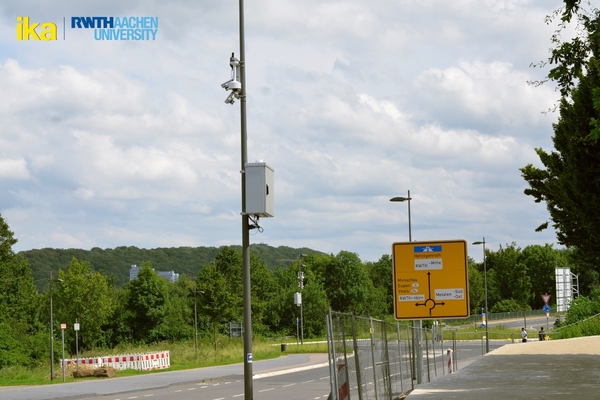Mobility Connected and autonomous vehicles Integrated environment created in Aachen to test automated vehicles
The Corridor for New Mobility Aachen comprises three disparate but interconnected sites to test and validate connected and automated driving functions.
Forty-six metering stations have been established on existing traffic infrastructure in Aachen © ika, RWTH Aachen
One of Europe’s largest and most comprehensive test environments for connected intelligent transport systems, the Corridor for New Mobility Aachen – Düsseldorf (ACCorD), has selected Cohda Wireless as a tech partner.
Cohda is supplying its road-side units (RSUs) to the research project, funded by the German Federal Ministry of Transport and Digital Infrastructure (BMVI), and delivered by the Institute for Automotive Engineering (ika) of RWTH Aachen University.
Automated driving
The corridor comprises three disparate but interconnected test sites to test and validate connected and automated driving functions. The first phase covers the Melaten Campus in Aachen, with two additional sites to be established later in the year.
These will be on the B56 federal road near Aldenhoven and on the A44 federal highway at the Jackerath interchange, and will allow the initiative to encompass urban, rural and highway traffic conditions.
“This initiative is a very large, integrated and appropriately complex test-bed that is likely to be a catalyst for more like it across Europe in the near future”
In Aachen, 46 metering stations have been established on existing traffic infrastructure along a 2.4km circuit, including cameras, lidars and Cohda’s RSUs. The cameras and lidars record a broad variety of raw data which is then processed locally before being converted into V2X messages for dissemination to vehicles from Cohda’s RSUs.
Data will also be analysed and processed centrally to identify road-user behaviour, trends and insights, ultimately to make road transport safer and more environmentally friendly.
Another component of the project is the design and implementation of a digital twin of the test field as a virtual image of the three test field sections for conducting tests in simulation. In addition, the test environment will be used to validate automated and connected test vehicles that will be deployed in the corridor to further develop automated driving functions.
“This initiative is a very large, integrated and appropriately complex test-bed that is likely to be a catalyst for more like it across Europe in the near future,” said Bernd Lübben, vice president of business development in Europe, Cohda Wireless.
“The combination of urban, rural and highway transport settings will offer interesting and useful data that will assist in paving the way for the introduction of connected and autonomous vehicles on our streets and highways.”
Among other partners, OEMs Ford and Moove are involved with automated and connected research vehicles in the project.
- #Analytics
- #Data
- Automated vehicles
- BMVI
- CAVs
- Cohda Wireless
- Connectivity & Data
- Corridor for New Mobility Aachen
- Dusseldorf
- German Federal Ministry of Transport and Digital Infrastructure
- Germany
- mobility
- Road
- Sensors




Leave A Comment